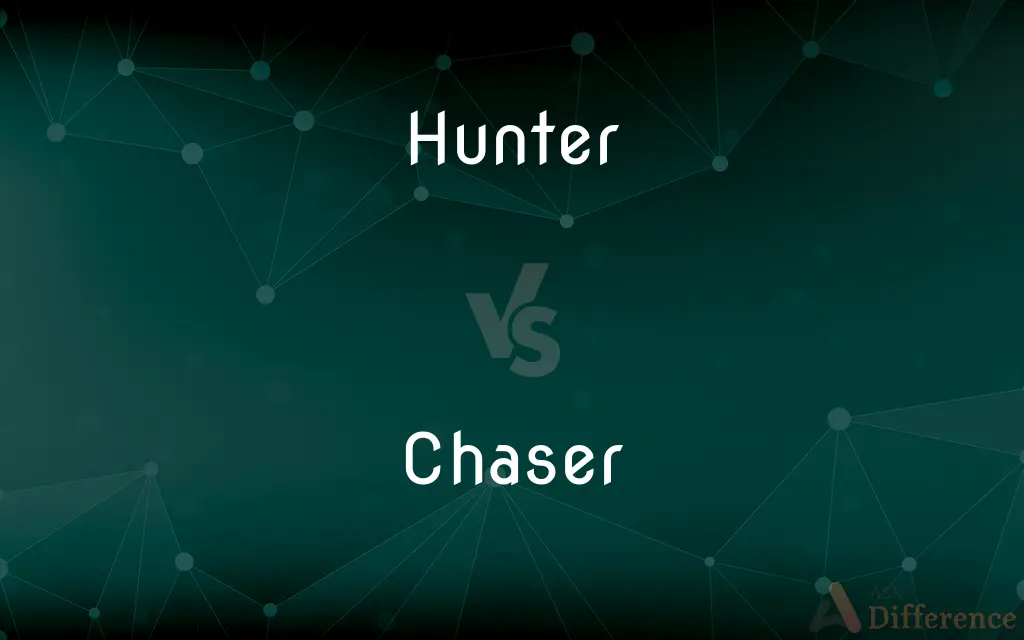Hunter vs. Chaser — What's the Difference?
By Tayyaba Rehman & Fiza Rafique — Updated on March 20, 2024
A hunter seeks or destroy wildlife for food, sport, or trade, while a chaser pursues or follows someone or something, often in sports or metaphorical contexts.

Difference Between Hunter and Chaser
Table of Contents
ADVERTISEMENT
Key Differences
A hunter is typically involved in the pursuit and capturing of wildlife, whether for sustenance, sport, or commercial purposes. This role is deeply rooted in human history and tradition, encompassing a wide range of practices from subsistence hunting to trophy hunting. On the other hand, a chaser often refers to someone or something that pursues or follows another with the intent to catch or reach them, commonly used in contexts ranging from sports to figurative expressions of pursuit, such as chasing dreams.
While the term "hunter" conjures images of individuals tracking and hunting animals in the wilderness, employing skills and tools developed for this purpose, "chaser" is a broader term that can apply to various pursuits. For example, in sports, a chaser might refer to a player who is tasked with catching or tagging opponents, as seen in certain team sports or games like tag. In a more metaphorical sense, a chaser could describe someone who is vigorously pursuing a goal, ambition, or even an abstract concept.
The skills and attributes associated with hunters and chasers can overlap, particularly in terms of persistence, strategy, and the ability to track or pursue. However, hunters are more specifically associated with knowledge of wildlife, survival skills, and often the ethical considerations of hunting practices. Conversely, chasers require agility, speed, and strategic thinking tailored to their specific context of pursuit, whether in sports, personal ambitions, or other forms of chase.
In terms of equipment and preparation, hunters typically rely on tools such as firearms, bows, and traps, along with knowledge of animal behavior and habitat. This contrasts with chasers, whose "equipment" may vary widely depending on their pursuit, from sports gear to the intellectual or physical skills necessary for achieving non-tangible goals.
The motivations driving hunters and chasers also differ. Hunters may be motivated by the need for food, the challenge of the hunt, conservation efforts through regulated hunting, or the social and cultural aspects of hunting traditions. Chasers, however, are driven by the desire to catch, achieve, or attain something, whether it be a physical object, a person, a title, or an intangible goal, reflecting a broader range of pursuits beyond the confines of hunting.
ADVERTISEMENT
Comparison Chart
Context
Wildlife hunting.
Sports, ambitions, and metaphorical pursuits.
Skills
Tracking, survival, knowledge of wildlife.
Agility, speed, strategic thinking.
Equipment
Firearms, bows, traps.
Varies by context (e.g., sports gear, knowledge).
Motivation
Food, sport, conservation, tradition.
Achievement, attainment of goals.
Compare with Definitions
Hunter
Often involves interaction with and understanding of natural habitats.
Responsible hunters participate in conservation efforts to maintain ecological balance.
Chaser
Can refer to roles in sports, ambitions, or metaphorical pursuits.
He was a chaser of dreams, always looking for his next adventure.
Hunter
Often associated with the pursuit and loss of animals.
The hunter used a bow for a more traditional hunting experience.
Chaser
Someone or something that pursues another.
In the game of tag, the chaser tries to catch the other players.
Hunter
A person who hunts game or wildlife.
The hunter prepared his rifle for the early morning hunt.
Chaser
Depends on the context of the chase, from physical to abstract environments.
In his career ambitions, he was known as a relentless chaser of success.
Hunter
Knowledge of animal behavior, tracking, and survival skills.
Expert hunters understand the importance of tracking signs in the wilderness.
Chaser
Speed, agility, and often strategic planning.
The chaser strategized the best route to intercept the ball.
Hunter
One who hunts game.
Chaser
One that chases or pursues another
A chaser of criminals.
Hunter
A dog bred or trained for use in hunting.
Chaser
A drink, as of beer or water, taken after hard liquor.
Hunter
A horse, typically a strong fast jumper, that has been bred or trained for use in hunting.
Chaser
One who decorates metal by engraving or embossing.
Hunter
One who searches for or seeks something
A treasure hunter.
Chaser
A steel tool for cutting or finishing screw threads.
Hunter
Hunter green.
Chaser
A person or thing (ship, plane, car, etc.) that chases.
Hunter
One who hunts game for sport or for food; a huntsman or huntswoman.
Chaser
(archaic) A hunter.
Hunter
A dog used in hunting.
Chaser
A horse: (originally) a horse used for hunting; (now) a horse trained for steeplechasing, a steeplechaser.
Hunter
A horse used in hunting, especially a thoroughbred, bred and trained for hunting.
Chaser
A drink drunk after another of a different kind.
Beer chaser
Straight, no chaser
Hunter
One who hunts or seeks after anything.
The hunter becomes the hunted.
A fortune hunter
Chaser
Someone who follows logs out of the forest in order to signal a yarder engineer to stop them if they become fouled also called a frogger.
Hunter
(psychology) A person who bottles up their aggression and eventually releases it explosively.
Chaser
(logging) One who unhooks chokers from the logs at the landing.
Hunter
A kind of spider, the huntsman or hunting spider.
Chaser
A piece of music, etc. played after a performance while the audience leaves.
Hunter
A pocket watch with a spring-hinged circular metal cover that closes over the dial and crystal, protecting them from dust and scratches.
Chaser
One of a series of adjacent light bulbs that cycle on and off to give the illusion of movement.
Hunter
One who hunts wild animals either for sport or for food; a huntsman.
Chaser
A long piece of flexible wire used to draw an electrical cable through a wall cavity.
Hunter
A dog that scents game, or is trained to the chase; a hunting dog.
Chaser
Synonym of prison chaser
Hunter
A horse used in the chase; especially, a thoroughbred, bred and trained for hunting.
Chaser
(slang) A tranny chaser.
Hunter
One who hunts or seeks after anything, as if for game; as, a fortune hunter a place hunter.
No keener hunter after glory breathes.
Chaser
(slang) A chubby chaser.
Hunter
A kind of spider. See Hunting spider, under Hunting.
Chaser
(slang) A person who seeks partners with HIV in order to become infected.
Hunter
A hunting watch, or one of which the crystal is protected by a metallic cover.
Chaser
In the sport of Quidditch or Muggle quidditch, a player responsible for passing the quaffle and scoring goals with it.
Hunter
Someone who hunts game
Chaser
Any dragonfly of family Libellulidae.
Hunter
A person who searches for something;
A treasure hunter
Chaser
Someone who chases decorates metal; a person who decorates metal by engraving or embossing.
Hunter
A watch with a hinged metal lid to protect the crystal
Chaser
A tool used for cleaning out screw threads, either as an integral part of a tap or die to remove waste material produced by the cutting tool, or as a separate tool to repair damaged threads.
Chaser
(nautical) A chase gun.
Bow chaser; stern chaser
Chaser
One who or that which chases; a pursuer; a driver; a hunter.
Chaser
Same as Chase gun, esp. in terms bow chaser and stern chaser. See under Bow, Stern.
Chaser
One who chases or engraves. See 5th Chase, and Enchase.
Chaser
A tool with several points, used for cutting or finishing screw threads, either external or internal, on work revolving in a lathe.
Chaser
A person who is pursuing and trying to overtake or capture;
Always before he had been able to outwit his pursuers
Chaser
A drink to follow immediately after another drink
Common Curiosities
How do hunters and chasers differ in motivation?
Hunters are motivated by the pursuit of game for various reasons, while chasers are driven by the desire to achieve or attain something.
What skills are unique to hunters?
Hunters require specific skills such as knowledge of wildlife, tracking, and survival techniques.
What does a chaser do?
A chaser pursues or follows someone or something, often in a competitive or metaphorical context.
How can someone be a chaser in a non-physical sense?
In a non-physical sense, a chaser might pursue goals, dreams, or ambitions, such as career success or personal achievements.
What equipment might a chaser need?
The equipment of a chaser varies widely by context, from sports gear for physical pursuits to knowledge and skills for metaphorical chases.
Are there ethical considerations for hunters?
Yes, ethical hunters follow conservation laws and respect wildlife, ensuring sustainable hunting practices.
What is a hunter?
A hunter is someone who hunts animals for food, sport, or trade, employing skills in tracking and knowledge of wildlife.
Can the term "chaser" apply to animals?
Yes, "chaser" can apply to animals, especially in contexts where one animal pursues another as part of natural behavior or in sports.
What is the significance of understanding wildlife for hunters?
Understanding wildlife is crucial for hunters to track and hunt responsibly, ensuring the safety of both the hunter and the animal populations.
Why is strategy important for chasers?
Strategy helps chasers plan their pursuit, whether in catching a competitor in a race or achieving a long-term goal.
Share Your Discovery

Previous Comparison
Umbrella vs. Gamp
Next Comparison
Deceitful vs. SlyAuthor Spotlight
Written by
Tayyaba RehmanTayyaba Rehman is a distinguished writer, currently serving as a primary contributor to askdifference.com. As a researcher in semantics and etymology, Tayyaba's passion for the complexity of languages and their distinctions has found a perfect home on the platform. Tayyaba delves into the intricacies of language, distinguishing between commonly confused words and phrases, thereby providing clarity for readers worldwide.
Co-written by
Fiza RafiqueFiza Rafique is a skilled content writer at AskDifference.com, where she meticulously refines and enhances written pieces. Drawing from her vast editorial expertise, Fiza ensures clarity, accuracy, and precision in every article. Passionate about language, she continually seeks to elevate the quality of content for readers worldwide.
















































